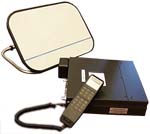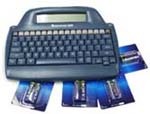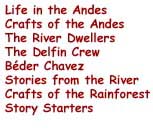|
We plan to record our daily events with photographs
and text then transmit that information once a day to a satellite hovering
overhead. The satellite will transmit the information back to a site
in the United States. Our friends in the United States who are helping
us with this project will post the information to this website.
The weather will be hot and humid. We will only have access to electricity
in the evenings or early mornings because the boat generator will only
operate at those times. There are no phones to call for technical help
if our equipment doesn't work, and there are no stores nearby to pick
up extra batteries if we need them.
We need to plan very carefully and consider every possible situation
if we are to be prepared for anything that happens. Of course, if we
are clumsy and knock the satellite phone off the boat into the water,
well, there just might not be anything we can do about that.
We also will need special software to get the information ready for
transmitting to the satellite.
Below is a list and description of what we think we are going to need
to do the job. What do you think? Have we left anything out? Logon to
our Guest Book and let
us know if you think of something we haven't. We need all the help we
can get.
|
|

|
We will be taking three computers with us to the Amazon; two
Macintosh G3 laptops and one Dell laptop. We will use the computers
to edit any pictures we take and write about the day's events.
Once a day, we will connect one of the computers to the satellite
phone and transmit our information to the United States.
Back to Top
|
|
|
|
|
|
|
|
|
|
|
|
|
|
|
|
|
|
|
|
|
|
|
|
|
|
|
|
|
|
|
|
|
|
|
|
|
|
|

|
The biggest piece of equipment we are taking is an Thrane &
Thrane Inmarsat-M satellite phone from LandSea Systems. Once we
have prepared all of our photos that we have taken during the
day,written our descriptions of the day's events, and complied
our research findings we will use the satellite phone to send
all of this to our friends here in the United States. They will
post it to our website (even if they have to stay up all night
to do so).
Back to Top
|
|
|
|
|
|
|
|
|
|
|
|
|
|
|
|
|
|
|
|
|
|
|
|
|
|
|
|
|
|
|
|
|
|
|
|
|
|
|

|
We are going to take four AlphaSmart Keyboards with us. They
are small, lightweight word processors that run a very long time
on AAA batteries. During the day we will use them to write about
what we are doing and seeing. At the end of each day, we will
use an infrared connection to "beam" what we have written to our
computers. By using the AlphaSmarts we will save our computer
batteries for the bigger task of getting all of our information
ready for transmitting to the satellite at the end of each day.
Back to Top
|
|
|
|
|
|
|
|
|
|
|
|
|
|
|
|
|
|
|
|
|
|
|
|
|
|
|
|
|
|
|
|
|
|
|
|
|
|
|

|
In order to backup the text, image and sound files that we have
on our computers, we will be using Iomega Jazz and Zip drives.
They hold a lot more data than floppy disks and are more durable.
If we back up our data daily, we won't lose anything if one of
our computers crash.
Back to Top
|
|
|
|
|
|
|
|
|
|
|
|
|
|
|
|
|
|
|
|
|
|
|
|
|
|
|
|
|
|
|
|
|
|
|
|
|
|
|

|
To make it easier to transfer computer files between our computers,
we will use a 5-port mini hub from Farallon Communications. We
will plug our computers into the hub via their ethernet ports
and the computers can "talk" to each other.That way we don't have
to bother with floppy disks which don't hold very much information
anyway. The hub takes electricity so we will only use this when
the boat's generator is running.
Back to Top
|
|
|
|
|
|
|
|
|
|
|
|
|
|
|
|
|
|
|
|
|
|
|
|
|
|
|
|
|
|
|
|
|
|
|
|
|
|
|

|
We will be using digital cameras to take photos. That way we
will be able to connect the cameras to our computers and see the
pictures immediately. Before we send the images to the satellite
we will need to work with them to get them the right size so that
we can quickly transmit them.
Back to Top
|
|
|
|
|
|
|
|






